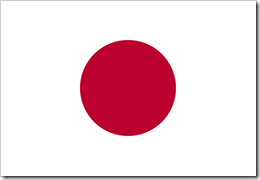 Imagine a whole country ceasing to exist. It is the kind of stuff that screenwriters imagine when crafting stories for new movies. But usually in their scripts the cause of extinction is something sudden and catastrophic. The aliens come. The earthquake rocks. The tsunami cascades.
Imagine a whole country ceasing to exist. It is the kind of stuff that screenwriters imagine when crafting stories for new movies. But usually in their scripts the cause of extinction is something sudden and catastrophic. The aliens come. The earthquake rocks. The tsunami cascades.
But forget the Hollywood stuff. A new research study suggest that in a thousand years at the current trends there will be no Japanese children in the world at all. And what is the cause? Simple. People are not having children. They do not even replace themselves let alone allow for any growth.
I know that a thousand years away in a long time. 3011 may well never come (Come quickly, Lord.). The trends may well change. But the article makes clear that the trend is already problematic today. It is already causing trouble in the society. There are not enough workers to pay for the pensions of those not working. They are producing more adult diapers than children’s diapers. And these are just a few of the issues of having many elderly people and few young active people.
There are many in our society that want us to walk the way of Japan and other countries like China. Some suggest that China’s one child policy should be a model. They say it is good for the Earth. They say people are the problem.
Children are a blessing. This is the position of the scriptures. Disregarding this truth not only is bad in relationship to God but it also causes many troubles in society. It leaves us with many elderly people in need of care and no one to care for them. May God give us eyes to see beyond our immediate concerns and faith to trust in his promises.
|
Japan faces ‘extinction’ in 1,000 years (Click for full article) By Kyoko Hasegawa (AFP) – 8 hours ago TOKYO — Japanese researchers on Friday unveiled a population clock that showed the nation’s people could theoretically become extinct in 1,000 years because of declining birth rates. Academics in the northern city of Sendai said that Japan’s population of children aged up to 14, which now stands at 16.6 million, is shrinking at the rate of one every 100 seconds. Their extrapolations pointed to a Japan with no children left within a millennium. "If the rate of decline continues, we will be able to celebrate the Children’s Day public holiday on May 5, 3011 as there will be one child," said Hiroshi Yoshida, an economics professor at Tohoku University. "But 100 seconds later there will be no children left," he said. "The overall trend is towards extinction, which started in 1975 when Japan’s fertility rate fell below two." Yoshida said he created the population clock to encourage "urgent" discussion of the issue. Another study released earlier this year showed Japan’s population is expected to shrink to a third of its current 127.7 million over the next century. Government projections show the birth rate will hit just 1.35 children per woman within 50 years, well below the replacement rate. Meanwhile, life expectancy — already one of the highest in the world — is expected to rise from 86.39 years in 2010 to 90.93 years in 2060 for women and from 79.64 years to 84.19 years for men. More than 20 percent of Japan’s people are aged 65 or over, one of the highest proportions of elderly in the world. Japan has very little immigration and any suggestion of opening the borders to young workers who could help plug the population gap provokes strong reactions among the public. The greying population is a headache for policymakers who are faced with trying to ensure an ever-dwindling pool of workers can pay for a growing number of pensioners. But for some Japanese companies the inverting of the traditional ageing pyramid provides commercial opportunities. Unicharm said Friday that sales of its adult diapers had "slightly surpassed" those for babies in the financial year to March, for the first time since the company moved into the seniors market. |
